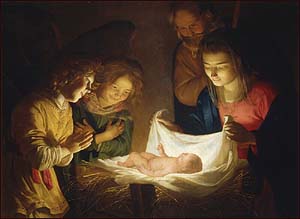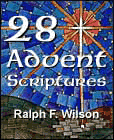
|
Old Testament
New Testament
Gospels
Acts
Paul's Letters
General Letters
Revelation
Topical Studies
Beginning the Journey (for new Christians). en Español

|
Old Testament
New Testament
Gospels
Acts
Paul's Letters
General Letters
Revelation
Topical Studies

|
Home
Bible Studies
Articles
Books
Podcasts
Search
Menu
Donate
About Us
Contact Us
FAQ
Sitemap
Christmas Day. We Have Seen His Glory (John 1:1-14)
Read on Christmas Day whenever it falls this week.
Depending on the year, December 25th can occur any day this week. On Christmas Day read this reading instead of the normal reading for the day -- if you like.
(Readings and prayers for lighting the Christ Candle are available in Appendix 1.)
Read in the Bible: John 1:1-14
 Gerard (Gerrit) van Honthorst (1590-1656), 'Adoration of the Children' (1620), Uffizi Gallery, Florence. Italy. |
The Word Was God (John 1:1-4)
John's Gospel doesn't speak of the manger and shepherds, but focuses directly on Jesus and who he is.
"1 In the beginning was the Word, and the Word was with God, and the Word was God. 2 He was with God in the beginning. 3 Through him all things were made; without him nothing was made that has been made. 4 In him was life, and that life was the light of men. 5 The light shines in the darkness, but the darkness has not understood it." (John 1:1-5, ESV)
In this passage we learn several things about the Son.
- He is called the Word -- the Logos, the very communication, expression of the Father. God's message to the world in human form,169
- He is with God and is God,
- He is the Creator of all things,
- He is the source of Life, and
- He is the brilliant Light that illuminates the dark corners of our souls and dispels our darkness.
Since Christ is so central to any meaning on Planet Earth, so much the essence of life itself, it is impossible for a human being to construct a healthy, vibrant personal identity without him at its center. You can fake independence, but ultimately life without Christ as Lord is hollow, dim, unfulfilling, and off-balance.
The War between Light and Darkness (John 1:5)
There is so much to talk about in this very rich passage, but I want to focus on the pitched battle between Light and darkness (see Day 5).
"The light shines in the darkness,
but the darkness has not understood it." (John 1:5, NIV)
"Darkness" in verse 5 seems to almost personify both the prince of darkness, Satan, and all those who live in spiritual darkness. Light is shining but they somehow haven't "understood" or grasped it. Moreover, the Greek word suggests that they haven't "overcome" the light.170 John observes:
"The reason the Son of God appeared was to destroy the devil's work." (1 John 3:8)
Christ's light, God's glory, represents and brings true life itself. Light is brimming with inextinguishable Life. And this Light and Life attack darkness and death wherever they are found.
The Light Is Not Recognized or Received by All (John 1:9-13)
Sadly, not all are willing to receive this light.
"9 The true light, which gives light to everyone, was coming into the world. 10 He was in the world, and the world was made through him, yet the world did not know him. 11 He came to his own, and his own people did not receive him." (John 1:9-11)
Though Jesus is a Jew, the Jewish leaders as a whole reject him and ultimately crucify him! Jesus' mission is exclusively directed towards the "lost sheep of the house of Israel" (Matthew 15:24; 10:6), but they don't listen. They reject the Light.
The battle between light and darkness rages on. Paul speaks of it:
"The god of this world has blinded the minds of the unbelievers, to keep them from seeing the light of the gospel of the glory of Christ, who is the image of God." (2 Corinthians 4:4)
Many resist this Light and refuse to allow his searching brilliance to illuminate the dark corners of their hearts. Yet to those who receive him and keep focused on him, there is wonderful healing, cleansing and change.
"And we all, with unveiled face,
beholding the glory of the Lord,
are being transformed into the same image
from one degree of glory to another." (2 Corinthians 3:18)
The Word Became Flesh (John 1:14a)
Now we come to the astounding text, the ultimate Christmas text:
"And the Word became flesh and dwelt among us,
and we have seen his glory,
glory as of the only Son from the Father,
full of grace and truth." (John 1:14)
Christmas is all about the Word becoming flesh, taking on a human body, a physical body. The theological word for this is "incarnation." Paul describes it poetically in his letter to the Philippians (Day 28).
"Who, being in very nature God,
did not consider equality with God something to be grasped,
but made himself nothing,
taking the very nature of a servant,
being made in human likeness.
And being found in appearance as a man,
he humbled himself
and became obedient to death --
even death on a cross!" (Philippians 2:6-8)
Glory of the 'Only-Begotten' (John 1:14b)
Look again at the second half of verse 14.
"Glory as of the only Son from the Father,
full of grace and truth." (John 1:14b)
Several concepts demand our attention.
First, Uniqueness is expressed as the "only Son" or the "only begotten Son" from the Father.171 He is not just another created human being. Jesus is utterly unique.
Second, Glory. Throughout the Old Testament we read about the "glory of God," sometimes manifested in fire and brightness, the "Shekinah," the dwelling or settling of the divine presence. John himself had seen that very Shekinah glory upon Jesus during the transfiguration, and was, with Peter and James, "eyewitnesses of his majesty" (2 Peter 1:16-18).
Third, Grace. Jesus is "full of grace and truth." His favor or grace172 is not based upon our worthiness, rather, it is unilateral. God doesn't love us (that is, show favor to us) because we are deserving. His grace or favor doesn't have anything to do with our worthiness. Jesus took our sins upon him to make us worthy.
Fourth, Truth. Jesus is the truth-teller to the world. He tells good news and exposes as lies the so-called truths about ourselves that we desperate people have been clinging to. He declares:
"If you hold to my teaching, you are really my
disciples.
Then you will know the truth,
and the truth will set you free." (John 8:31b-32)
Truth is freeing but dangerous. Truth's enemies seek to suppress it. Its enemies want to kill anyone who speaks it (John 8:40). The devil is the polar opposite of truth: "a liar and the father of lies," and "there is no truth in him" (John 8:44). But if we walk in Jesus' light (1 John 1:7), we find our way to the Father.
 Also available in book formats: PDF, Kindle, and paperback. |
"I am the way, and the truth, and the life.
No one comes to the Father except through me." (John 14:6)
Christmas Day is the celebration of God's light coming into the world in the person of Jesus Christ of Nazareth. Embrace him today. Embrace his searching light. Embrace his truth. And let his glory infuse and change you.
Prayer
Jesus, you who have come with your searing truth and your all-encompassing love to heal us and forgive us and make us whole. We surrender afresh to you this Christmas Day. Help us to follow you each day of our lives until that day when we find our home with you. In your holy and hopeful name, we pray. Amen.
Discussion Question
Christmas Day. (John 1:1-14) According to John 1:1-2,
when did Jesus first appear on the scene? How divine is he? What is the
theological term describing Jesus becoming a human being? (verse 14). In what
way does he bring us grace and favor from God? In what way does he demand that
we acknowledge his truth?
https://www.joyfulheart.com/forums/topic/2097-christmas-light/
Endnotes
[169] "Word" is the extremely common Greek noun logos, "word, a communication by which the mind finds utterance." It can have a wide range of meanings, depending on the context, such as "statement, assertion, message, declaration." But the use in John 1:1 is unique. Here logos is "the independent personified expression of God" (logos, BDAG 601, 3).
[170] "Understood" (NIV), "overcome" (NRSV, ESV), "comprehended" (KJV) is katalambanō, which has the basic meaning of "to seize, lay hold of," could refer to gaining a mental or spiritual grasp ("understood" or "comprehend"). But it can also mean, "seize with hostile intent, overtake, come upon" ("overcome") (BDAG 520, meanings 1, 2, and 3).
[171] "One and Only" (NIV), "only Son" (ESV, NRSV), "only begotten" (KJV) is the Greek adjective monogenēs, here, "pertaining to being the only one of its kind or class, unique (in kind)," of something that is the only example of its category (BDAG 658, 2). We shouldn't overly stress the idea of begetting, since the word derives from the verb ginomai, "be born, become," rather than gennaō, "beget" (Morris, John, p. 105, fn. 93), (though used with "from the Father," begetting would be implied).
[172] "Grace" is charis, here, "practical application of goodwill, (a sign of) favor, gracious deed/gift, benefaction" (BDAG, 10, 3b). Such favor is never dependent upon the worthiness of the recipient, but the will of the giver.
Copyright © 2026, Ralph F. Wilson. <pastor![]() joyfulheart.com> All rights reserved. A single copy of this article is free. Do not put this on a website. See legal, copyright, and reprint information.
joyfulheart.com> All rights reserved. A single copy of this article is free. Do not put this on a website. See legal, copyright, and reprint information.

